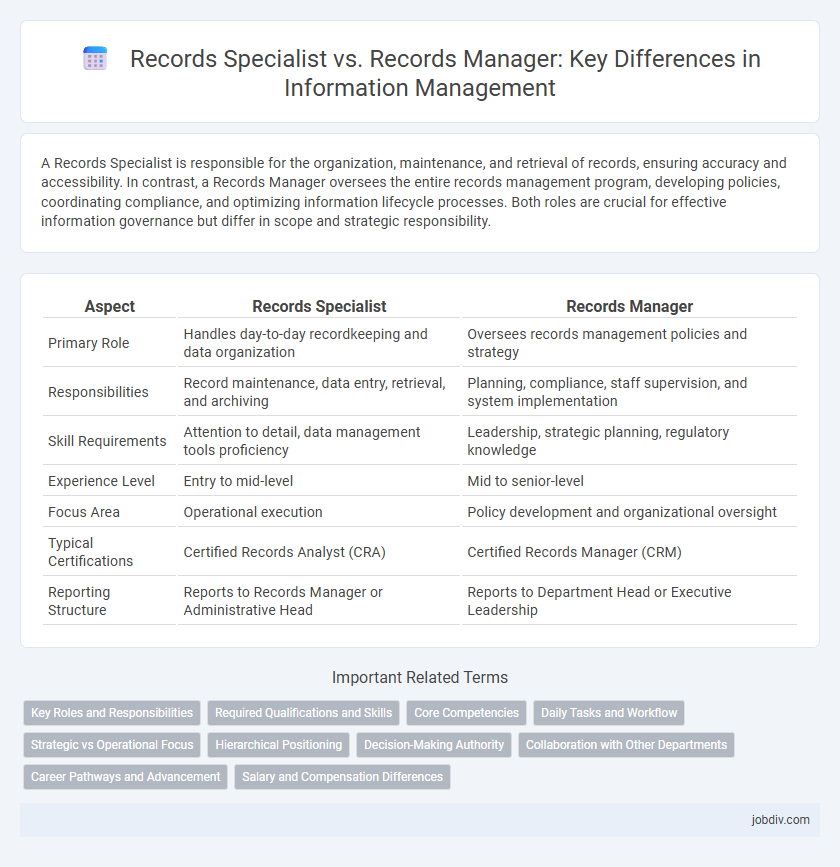A Records Specialist is responsible for the organization, maintenance, and retrieval of records, ensuring accuracy and accessibility. In contrast, a Records Manager oversees the entire records management program, developing policies, coordinating compliance, and optimizing information lifecycle processes. Both roles are crucial for effective information governance but differ in scope and strategic responsibility.
Table of Comparison
| Aspect | Records Specialist | Records Manager |
|---|---|---|
| Primary Role | Handles day-to-day recordkeeping and data organization | Oversees records management policies and strategy |
| Responsibilities | Record maintenance, data entry, retrieval, and archiving | Planning, compliance, staff supervision, and system implementation |
| Skill Requirements | Attention to detail, data management tools proficiency | Leadership, strategic planning, regulatory knowledge |
| Experience Level | Entry to mid-level | Mid to senior-level |
| Focus Area | Operational execution | Policy development and organizational oversight |
| Typical Certifications | Certified Records Analyst (CRA) | Certified Records Manager (CRM) |
| Reporting Structure | Reports to Records Manager or Administrative Head | Reports to Department Head or Executive Leadership |
Key Roles and Responsibilities
Records Specialists manage the accurate organization, maintenance, and retrieval of records, ensuring compliance with regulatory standards. Records Managers oversee the overall records management program, including policy development, strategic planning, and coordination across departments. Both roles require expertise in data classification and preservation but differ in scope, with the manager focusing on leadership and the specialist focusing on operational execution.
Required Qualifications and Skills
Records Specialists require proficiency in document organization, metadata management, and basic knowledge of compliance regulations, often holding certifications like Certified Records Analyst (CRA). Records Managers need advanced skills in records lifecycle management, regulatory compliance, strategic planning, and leadership, frequently possessing credentials such as Certified Records Manager (CRM). Both roles demand strong attention to detail, familiarity with electronic records systems, and excellent communication skills to ensure effective information governance.
Core Competencies
Records Specialists excel in document organization, data entry accuracy, and compliance with records retention policies, ensuring efficient information retrieval and management. Records Managers possess advanced skills in developing records management programs, overseeing staff, and implementing regulatory compliance frameworks to safeguard organizational information assets. Both roles require mastery of electronic records systems, confidentiality protocols, and strong analytical abilities to maintain data integrity and support business operations.
Daily Tasks and Workflow
Records Specialists focus on organizing, maintaining, and retrieving records efficiently, handling data entry, indexing, and ensuring document accuracy on a daily basis. Records Managers oversee the entire records lifecycle, developing policies, managing compliance, and coordinating teams to optimize recordkeeping workflows. Both roles prioritize data integrity and accessibility but differ in scope, with Specialists managing operational tasks and Managers directing strategic records management processes.
Strategic vs Operational Focus
Records Specialists handle day-to-day document management tasks, ensuring accurate filing, retrieval, and compliance with policies. Records Managers focus on strategic planning, developing records management frameworks, and aligning information governance with organizational goals. Emphasizing operational efficiency, Specialists execute procedures while Managers guide long-term information lifecycle strategies.
Hierarchical Positioning
A Records Specialist typically operates under the supervision of a Records Manager, handling day-to-day tasks such as organizing, cataloging, and maintaining records. The Records Manager holds a higher hierarchical position, overseeing strategic planning, compliance, and policy implementation for records management across the organization. This managerial role involves directing the Records Specialists and ensuring alignment with data governance and legal standards.
Decision-Making Authority
Records Specialists primarily handle the organization, maintenance, and retrieval of records, following established policies and procedures with limited decision-making authority. Records Managers oversee the entire records management program, including developing policies, setting retention schedules, and authorizing access, granting them higher decision-making authority. Their role involves strategic planning and compliance enforcement, impacting organizational information governance.
Collaboration with Other Departments
Records Specialists maintain accurate documentation and ensure compliance by collaborating with legal, IT, and compliance teams to manage data effectively. Records Managers oversee cross-departmental communication, aligning records policies with organizational goals and facilitating information sharing between finance, HR, and operations departments. Both roles require strong coordination skills to promote efficient records management and support decision-making processes across multiple business units.
Career Pathways and Advancement
Records Specialists typically begin their careers handling day-to-day document management and data entry, building foundational expertise in information organization. Progression to a Records Manager role involves acquiring leadership skills, overseeing compliance, and managing records policies across departments or organizations. Career advancement often includes earning certifications like Certified Records Manager (CRM) and gaining experience in digital records systems to qualify for senior management or administrative positions.
Salary and Compensation Differences
Records Specialists typically earn between $40,000 and $55,000 annually, reflecting their focus on maintaining and organizing records. Records Managers command higher salaries, often ranging from $65,000 to $90,000, due to their broader responsibilities overseeing records policies and staff. Compensation packages for Records Managers frequently include bonuses and benefits tied to management performance, distinguishing them from the more standardized pay for Records Specialists.
Records Specialist vs Records Manager Infographic

 jobdiv.com
jobdiv.com